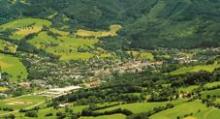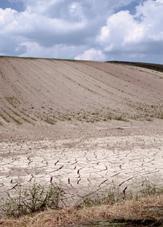fertile soil
For thousands of years, man has purposefully produced food on soils. Not all types of soil, however, prosper just as well as plants. The soils differ, for instance, in their ability to store water such that plants can use it in dry periods. In order for plants to be able to grow, they need a large number of nutriments, which they receive in dissolved form from the fertile soil.
In soils used for agricultural purposes, the withdrawal of nutriments on account of harvesting has to be balanced by fertilization. The importance of the soil as the basis for alimentation has widely fallen into oblivion in the industrialized countries. Nowadays one can hardly imagine any more, that in the past centuries there were frequent periods of famine also in Europe. The reasons therefore were, for instance, lack of nutriments or pathogenic germs in the soil, which survived mild winters and caused crop failures. After World War II the provision of food was the crucial aim. The European Community reacted upon this and determined the aim to increase productivity in order to safeguard an adequate living standard of the population in the Treaty of Rome. The measures taken, hower, have gone beyond the limit. The distribution of food in modern society has, in the industrial countries, also led to the fact that alimentation was separated from the production of crops in the fields. Who is thinking about the chain chocolate - milk - cow - grass - soil, when he is having a snicker? A large part of food is furthermore imported, so that all types of food are at our disposal at any time.
This leads to "oblivion of the soil" and an all too careless treatment of the soil, respectively, because there is hardly a life-threatening lack of food to be feared:
Soils, however, are an essential basis of life for man. Man produces on soils over 90 per cent of all food, of animal food and fibres. The fertility of soil is linked to a careful treatment of the soil and a sustainable cultivation, which especially takes into consideration the development of humus.
Agriculture with respect for the soil is therefore linked to sustainable cultivation with humus.
Agriculture can contribute to soil protection in the soils cultivated by means of the type of soil cultivation. In this context, approaches are mulches as a protection against erosion and proper fertilization, which is organized on the basis of natural potentials and the history of cultivation up to now.
04.11.2025
EUSDR PA10: 12th Danube Participation Day in Sarajevo
more ...30.10.2025
Online-Präsentation BBK-Projekt CNSoil - Zwischenergebnisse
more ...07.10.2025
CatchHedge - Potenziale von Hecken im Zeichen des Klimawandels
more ...16.+17.09.2025
32nd Conference of the Danube Region
more ...12.09.2025
Grundlagen der professionellen Bio-Mandel-Produktion
more ...10.09.2025
Agroforst u. Marktgärtnerei, Symbiose
more ...05.09.2025
Regionales Wiesensaatgut gewinnen mit dem Wiesensamenernter
more ...25.06.2025
Feldtag - StripTill im Bio-Mais im Trockengebiet
more ...25.06.2025
Seminar: Wildbienen- und Nützlingsförderung im Biolandbau
more ...24.06.2025
BOKU Green Plate Forum 3.0
more ...24.06.2025
Die Maulbeere - Kultur, Produktion u.Verwendung
more ...17.06.2025
Frühjahrstagung Österr. Gesellschaft für Agrar- und Umweltrecht (ÖGAUR)
more ...13.06.2025
Seminar: Artenvielfalt in Ackerbauregionen fördern
more ...03.06.2025
Seminar: Keine Angst vor der Ackerdistel
more ...03.06.2025
Agroforstsysteme: Anbau-Modelle der Zukunft
more ...20.05.2025
IDM-Generalversammlung 2025
more ...15.05.2025
Seminar: Unkräuter/Beikräuter erkennen und als Zeigerpflanzen nutzen
more ...13.+14.05.2025
Bodenforum Österreich - Frühjahrstreffen
more ...04.05.2025
Tageskurs: Perma-Veggies - Mehrjähriges Gemüse und essbare Stauden
more ...03.05.2025
Waldgärten-Exkursion
more ...




